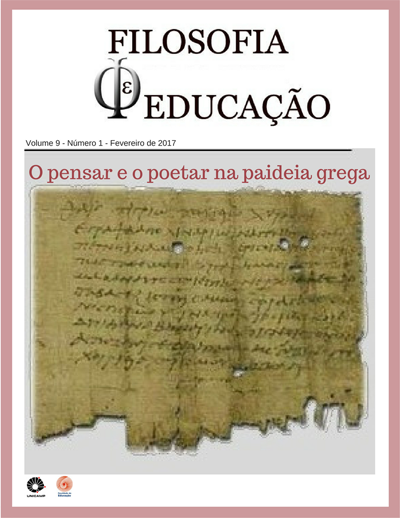Resumo
Este trabalho argumenta que há dois conceitos de ginástica envolvidos na proposta educativa da República de Platão: a ginástica da temperança e a ginástica para a coragem. A ginástica da temperança é uma autoeducação sobre o cuidado do corpo. Ela depende da educação pela poesia e consiste em um regime pessoal. Todos os cidadãos devem praticá-la. A ginástica para a coragem é uma prática funcionalmente especializada dos guardiões e consiste em treinamento atlético. Ela visa o fortalecimento da parte impetuosa e a preparação para o regime de resistência que lhes é demandado ao longo de toda a vida.
Referências
ANONYMUS LONDINIENSIS. De medicina. Edição de Daniela Manetti. Berlin: De Gruyter, 2011.
ARAÚJO, C. O belo e o fim da educação poética. In: Bocayuva, I., Anachoreta, M. I. (org.) O belo na Antiguidade Clássica. Rio de Janeiro: Nau, 2016, p. 95-101.
ARISTÓTELES. Ethica Nicomachea. Edição de I. Bywater. Oxford: Oxford University Press, 1979.
BURNYEAT, M. F. Culture and Society in Plato’s Republic. The Tanner Lectures on Human Values. Salt Lake City: University of Utah Press, 1999, 215-324.
DEMOS, R. "Paradoxes in Plato's Doctrine of the Ideal State," Classical Quarterly, N.S. 7: 164–174 (1957)
EDELSTEIN, L., The dietetics of Antiquity. In: Temkin, O., Temkin, C. (org.). Ancient medicine, Baltimore 1967, 303-316.
FERRARI, G. R. F. The Philosopher’s Antidote. In: Denham, A. (org.) Plato on art and beauty. New York: Palgrave Macmillan: 2012. p. 106-124.
GARDINER, E. N. Athletics of the Ancient world. Oxford: Clarendon Press, 1955.
GASTALDI, S. Paideia/mythologia. In: Vegetti, M. (org.), Platone. La Repubblica, v. II, Bibliopolis, Nápoles, 1998, 333-392.
GOLDEN, M. Sport and society in Ancient Greece. Cambridge: Cambridge University Press, 1998.
HIPÓCRATES et Corpus Hippocraticum. Oeuvres complètes d'Hippocrate. Edição de E. Littré. Paris: Baillière, 1973.
HOBBS, A. Plato and the hero: courage, manliness and the impersonal Good. Cambridge: Cambridge University Press, 2000.
IRWIN, T. Plato’s Ethics. Oxford: Oxford University Press, 1995.
JAEGER, W. Paideia: a formação do homem grego. Tradução de Artur M. Parreira. São Paulo: Martins Fontes, 1995.
KENNELL, N. M. The gymnasium of virtue: education and culture in Ancient Sparta. Chapel Hill: University of North Carolina Press, 1995.
MARROU, H. I. Histoire de l’éducation dans l’Antiquité. Paris: Seuil, 1948.
NETTLESHIP. R. L The theory of education in Plato’s Republic. London, 1935.
NORTH, H. Sophrosyne: self-knowledge and self-restraint in Greek literature. Cornell University Press, 1966.
NUTTON, V. Ancient Medicine. Londres: Routledge, 2004.
PLATÃO. Platonis Rempublicam. Edição de S. R. Slings. Oxford: Oxford University Press, 2003.
PLATÃO. Platonis opera. Edição de J. Burnet. Oxford: Clarendon Press, 1968.
PHILLIPS, E. D. Greek medicine. Londres: Thames and Hudson, 1973.
RADEMAKER, A. Sophrosyne and the rhetoric of self-restraint. Leiden: Brill, 2005.
SCHOFIELD, M. Plato Political Philosophy. Oxford: Oxford University Press, 2006.
TUCÍDIDES. Thucydidis historiae. Edição de. Jones, H.S., Powell, J.E. v. 1. Oxford: Clarendon Press, 1970.
WEST, M. L. Phocylides. Journal of Hellenic Studies 98, 1978, p. 164–167.
O periódico Filosofia e Educaçãoutiliza a licença do Creative Commons (CC), preservando assim, a integridade dos artigos em ambiente de acesso aberto.

